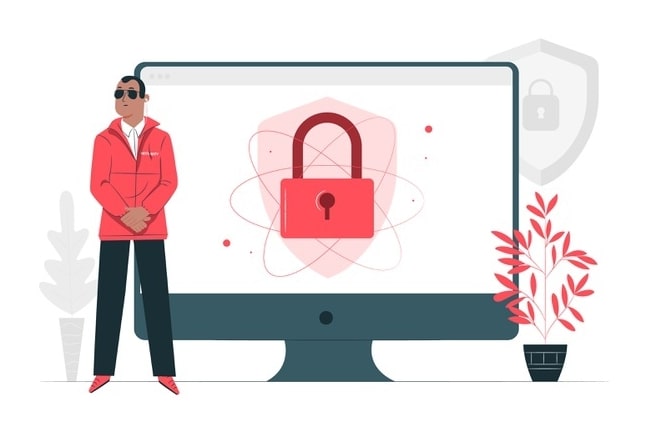Disclosure: Aussie Hosting is community run. We sometimes earn a commission when you buy hosting through our links. Learn more.
What is Domain Privacy
 This may sound shocking to you, but back in the grand old time of pre-2010s, there used to be these huge books where people stored their phone numbers.
This may sound shocking to you, but back in the grand old time of pre-2010s, there used to be these huge books where people stored their phone numbers.
Those big books, or phone books if you will, were distributed to everybody and essentially functioned as a public register of all the numbers you could call. So if you wanted, you could find and call pretty much anybody you wanted to!
Well, websites have something similar: a domain directory run by the ICANN, wherein all domains are registered. Actually, that’s essentially the job of a domain registrar, in that they will take the domain name you’ve picked and put it into the ICANN registry. This allows pretty much anybody to find the owner of any website or URL . . . and that’s the problem.
What Exactly is Domain Privacy?
This registry, called WHOIS, can be looked up by anybody. This can be your competitor, it can be somebody who has it out for you, or it could just be somebody you really have no interest in talking to.
Now, for most websites that’s not a problem, because even though an address is registered, usually it’s for an organization or a corporation, so it’s not a big deal. Unfortunately, for those that run their business out of their homes, or a smaller, less secure location, this can become a pretty big problem quickly.
As such, the whole idea behind domain privacy is to protect your personal contact details from finding their way onto WHOIS. This isn’t just a benefit for companies working out of a person’s home, but also companies that operate out of a physical store.
So how do you get it? Well simply put your domain registrar will often offer this service, either as part of the cost of purchasing the domain or as an extra addon. What they do then is that they provide their information, instead of yours, so if anybody tries to look at your domain on WHOIS, all they’ll see is your domain registrars.
Of course, the flip side of this service is that it costs money, and if you’re already on a tight budget, that can be problematic.
Related Read: What is DNS?
Why Does Domain Privacy Matter?
 While your address (or the address of the company) is one of the main privacy issues that gets added to WHOIS, there are actually additional things like email, country of origin, and information of that nature. This can, in turn, lead to other problems.
While your address (or the address of the company) is one of the main privacy issues that gets added to WHOIS, there are actually additional things like email, country of origin, and information of that nature. This can, in turn, lead to other problems.
For one, there are automated programs out there called bots whose whole job is to scrape WHOIS and websites for personally-identifying pieces of information.
This information is then either used for spam or sold to a 3rd party to be used for an unknown purpose. By getting domain privacy, you protect yourself from that sort of leak or attack.
Another thing that may happen is domain hijacking. That’s when a malicious actor uses that WHOIS information and social engineering to gain access to your account. They can then take your domain from you and either ransom it, or keep it for their own purposes, such as redirecting your traffic to their website.
Finally, there’s the fact that a competitor could use your information against you. For example, if you’re using your small business website as a digital storefront, a competitor could find the location of your store and target customers in your area with digital or even physical advertising.
Is There a Domain Privacy Workaround?
 Alright, so it’s pretty clear that domain privacy is certainly needed, but what if you can’t afford the $10-$20 extra a year that this might cost?
Alright, so it’s pretty clear that domain privacy is certainly needed, but what if you can’t afford the $10-$20 extra a year that this might cost?
You also might not be happy with the fact that the name of the domain in WHOIS is considered the owner of the website, so if that’s your domain registrar, ICANN considers them the owner.
Well, the first thing you need to know is that it's against the terms of service to give fake information to ICANN.
That means you can’t really spoof your address or your name if you don’t want to get into trouble. Granted, you could probably operate for a fake name for a little while, but at some point you will be caught, and ICANN will take that domain away from you.
There is one option though, and that’s using a P.O. box for you to register with. Granted, your name and email address will be on WHOIS anyway, but at least your physical address won’t be, and that's certainly worth it if you’re working out of your home. That being said, getting a P.O. box can be expensive, and depending on where you are it may cost you up to $60/year.
That’s pretty expensive compared to the $10-$20/year of domain privacy service, especially if you’re on a tight budget.
The truth is, the best option is to go with a legitimate and well-regarded web host or registrar who won’t likely steal your website or domain from you. In that way, you can still do the cheaper option of getting domain privacy while having the peace of mind that your website will be safe. After all, they have a reputation to uphold, and stealing customer’s domains would destroy their business overnight.
Conclusion
As you can see, domain privacy is not only essential but often mandatory. While the cost can be an extra financial load to bear, it’s definitely worth it given what you’ll be getting back in return, and just for your own peace of mind.

